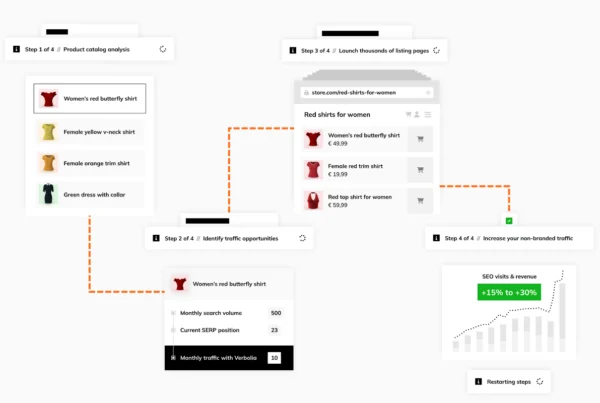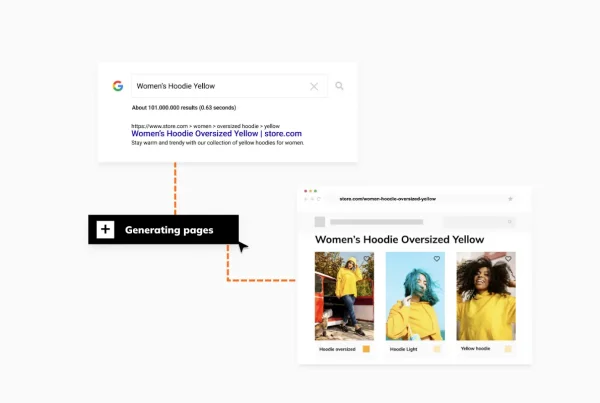Why is e-commerce SEO so hard?
Estimated reading time: 8 minutes

Most e-commerce businesses, regardless of their size or niche, rely on SEO as a vital channel for establishing their online presence, attracting potential customers, and finally driving revenue.Through the intricate art of optimizing web content to align with the algorithms of search engines like Google, e-commerce entrepreneurs and marketers aim to accomplish two pivotal objectives: boost brand visibility and increase organic traffic to their websites. However, having an effective, well-thought-out, and well-implemented SEO strategy is challenging, especially for e-commerce websites that have their own rules. The path to success in e-commerce SEO is riddled with challenges and complexities that set it apart from other digital marketing strategies.
E-commerce SEO is notorious for its complexity. The intersection of online retail and the ever-evolving algorithms of search engines makes it particularly challenging. Here’s a closer look at why this is the case:
- Competition: SEO is a major acquisition channel for all e-commerce players and is an extremely competitive industry for a very simple reason: for each keyword there are only 10 positions on the first page of Google (and only the very first ones really matter, especially on mobile).
- Brand authority: The war against spam has made search engines prioritize brand authority. This means e-commerce giants have secured top ranks, irrespective of factors like page speed, on-page optimization, and content uniqueness, often overshadowing smaller players with perhaps better SEO metrics.
- E-commerce CMS limitations: While platforms like Salesforce, Magento, WooCommerce, and Shopify are great at facilitating e-commerce operations, they aren’t inherently optimized for SEO. Main limitations are duplicated content issues, page load speeds, non-SEO-friendly URLs and limited technical flexibility.
- Time lag of SEO impact: it takes time to see tangible results from your efforts. Unlike paid advertisements that can instantly drive traffic and sales, the fruits of SEO initiatives are almost never immediate. This slow pace can make it hard to determine if your strategies are effective or if they need adjustments. A set of changes based on a solid SEO strategy might not see significant movement in rankings for weeks or even months. This can be both discouraging and misleading.
The diverse skills set required for e-commerce SEO
E-commerce SEO demands a diverse skill set that encompasses various aspects of digital marketing. Here’s what you need to know:
- Keyword research and selection: The core of effective e-commerce SEO lies in strategic keyword research and selection. Careful consideration of search intent, long-tail keywords, and emerging search trends is essential in optimizing your SEO strategy for success
- Content writing: High-quality content, including product descriptions and blog posts, plays a pivotal role in attracting both users and search engine algorithms. It’s essential to strike a balance between user engagement and SEO optimization.
- Link building: Building a strong backlink profile is vital for e-commerce SEO success. Understanding effective strategies for acquiring high-quality backlinks is crucial, as these links directly affect search engine rankings.
- Technical SEO: Technical aspects, such as site speed optimization, mobile-friendliness, and structured data implementation, have a substantial impact on SEO. Neglecting these elements can hinder your site’s performance in search results.
- Analytics and reporting: Tracking and measuring SEO efforts is essential for optimization. Utilize appropriate tools and metrics to monitor your SEO performance and make data-driven decisions.
- User experience (UX): The connection between user experience and SEO is profound. Factors like site navigation, page load times, and mobile responsiveness influence search engine rankings. Prioritizing a seamless user experience is integral to SEO success.
The collaborative effort behind e-commerce SEO
As we see, e-commerce SEO is a multifaceted discipline that necessitates collaborative effort from various teams within an organization:
- IT teams: IT teams play a pivotal role in ensuring that pages are loading fast, that all elements are properly named/tagged in the code, that the code of the pages is built in an optimized way (respecting Google Core Web Vitals) to simplify the crawling process by bots
- Content teams: Content is the backbone of e-commerce SEO. The content of each page must be relevant, not repetitive, as unique as possible. Basic elements like page titles, meta descriptions must be unique and properly engineered.
- UX teams: UX teams help to provide a proper experience on the pages so that users and bots actually find what they are looking for in an easy way. Thoughtful page linking streamlines bot crawling and allocate more importance to high-value pages.
- SEO Analysis team: SEO analysis teams closely monitor bot and user behavior, identify new keyword opportunities, and promptly respond to trends changes. Their insights play an indispensable role in fine-tuning your SEO strategy.
It happens constantly that SEO efforts are ruined by a change made by another team. What we observe is that if a large-scale SEO project is initiated at the highest decision level of an e-commerce company, all teams will work together to make it a success. However, very quickly after that, some IT security constraints will insert small changes that will make pages slower, or the UX team will add a new nice feature for users that will affect the internal linking or the Core Web Vitals, or make some content less visible to bots,…
Imagine planting a seed and eagerly waiting for it to sprout and grow. That’s how SEO works. While some green shoots might appear early, it usually takes a while for the plant to flourish.
Many SEO experts agree that the magic number to keep in mind is somewhere between 4 to 6 months to witness the first signs of success. For brand new websites it can take more than 12 months to see results, while established e-commerce sites will see impact faster.
We observe at Verbolia that new perfectly SEO optimized product listing pages are usually indexed really fast but ranking improvements take up to 9 to 12 months to get to full upside potential.
Example daily SEO visits from Verbolia pages
Example daily SEO visits from Verbolia pages – retail industry – high brand authority (285K monthly organic traffic from Branded keywords). Still growing 10 months after launch.

Example daily SEO visits from Verbolia pages – retail – high brand authority (185K monthly organic traffic from Branded keywords). Full potential reached after 9 months.

Example daily SEO visits from Verbolia pages – fashion – moderate brand authority (38K monthly organic traffic from Branded keywords). Still growing 1 year after launch.

Example daily SEO visits from Verbolia pages – sports – moderate brand authority (7K monthly organic traffic from Branded keywords). Still growing hard 1 year after launch.

Example daily SEO visits from Verbolia pages – pharmacy – moderate brand authority (5K monthly organic traffic from Branded keywords). Still growing after 7 months.

Example daily SEO visits from Verbolia pages – jobs – strong brand authority (150K monthly organic traffic from Branded keywords). Still growing hard after 6 months.

Conclusion
E-commerce SEO is a subtle balance of elements, each of them must be perfect in order to maximize the chances to “please” search engines. It’s also a multifaceted challenge, characterized by fierce competition, brand dominance, and technical limitations. Success in your SEO strategy demands a diverse skill set and collaboration across various teams within an organization and regrettably, very few companies are SEO-driven from the start.But like we mentioned, be patient; the efforts you invest now can pay off significantly in the long run.
About The Author
How can Verbolia help your e-commerce platform.


